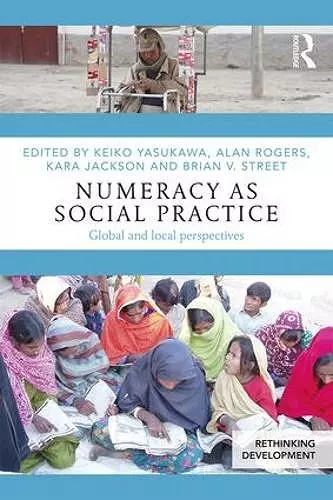Numeracy as Social Practice
Global and Local Perspectives
Alan Rogers editor Brian V Street editor Kara Jackson editor Keiko Yasukawa editor
Format:Paperback
Publisher:Taylor & Francis Ltd
Published:1st May '18
Currently unavailable, and unfortunately no date known when it will be back
This paperback is available in another edition too:
- Hardback£145.00was £145.00(9781138284449)

Learning takes place both inside and outside of the classroom, embedded in local practices, traditions and interactions. But whereas the importance of social practice is increasingly recognised in literacy education, Numeracy as Social Practice: Global and Local Perspectives is the first book to fully explore these principles in the context of numeracy. The book brings together a wide range of accounts and studies from around the world to build a picture of the challenges and benefits of seeing numeracy as social practice ̶ that is, as mathematical activities embedded in the social, cultural, historical and political contexts in which these activities take place.
Drawing on workplace, community and classroom contexts, Numeracy as Social Practice shows how everyday numeracy practices can be used in formal and non-formal maths teaching and how, in turn, classroom teaching can help to validate and strengthen local numeracy practices. At a time when an increasingly transnational approach is taken to education policy making, this book will appeal to development practitioners and researchers, and adult education, mathematics and numeracy teachers, researchers and policy makers around the world.
"The volume brings numeracy as social practice to life in ethnographic case studies of everyday numeracy practices and mathematics education in diverse international settings. Different theoretical perspectives are woven across the chapters, including New Literacy Studies, cultural-historical activity theory, critical theory and ethnomathematics. The editors masterfully craft all this into a coherent volume useful to researchers and mathematics educators around the world." -- Stephen Reder, Portland State University, USA
"This lucid account of numeracy as social practice is much needed and long overdue. It features an admirably broad scope and diversity, with chapters from every continent and from various educational, work, and other everyday settings. I especially like the discussions on relations between everyday numeracy practices and more formal mathematics, the invisibility of numeracy practices, and the importance of attending to power relations." -- Jeff Evans, Reader Emeritus, Middlesex University, London, UK
"This pioneering publication is timely in that the importance of learning as a social practice, especially numeracy as a social practice, is increasingly being understood and recognized by those concerned with quality education, formal/non-formal/lifelong/life-wide education. Rooted in a number of relevant research studies from around the world, and informed by theoretical influences highlighting the ‘social practices perspective on numeracy’, the authors engage the educators and researchers in broadening their vision of numeracy. This is a valuable resource book for researchers, activists and educators."L S Saraswathi, Social Activist, Trainer and Researcher in Development, Chennai, India
"The book Numeracy as Social Practice offers a wide and very well-structured perspective on a topic which is well known from research and discussion on literacy but which is less prominent regarding numeracy. The book not only states that numeracy learning is lifelong and life-wide but also proves this position by the variety of different contributions. We very much appreciate the fact that the authors of the individual chapters have made an impressive regional diversity possible. Moreover, they offer insights into a diverse range of educational contexts, reaching from schools to vocational education to adult basic education. The examples in the different chapters show that mathematical experiences might be mostly invisible in everyday lives, but they still exist and need a closer connection to educational programs. Acknowledging these experiences helps to reflect adequately on the deficit orientation in current discourses about competences and to criticize it in a well-founded way." – Book Review by Anke Grotlüschen and Klaus Buddeberg in Educational Studies in Mathematics journal
ISBN: 9781138284456
Dimensions: unknown
Weight: 422g
260 pages